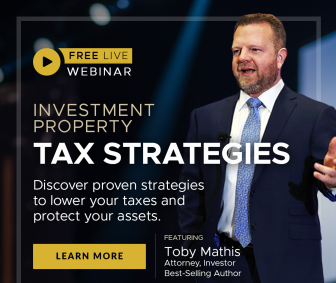
REtipster does not provide tax, investment, or financial advice. Always seek the help of a licensed financial professional before taking action.
It turns out the rich really do have more ways to invest and grow richer than the rest of us.
Some investments are only available to qualified investors, also known as accredited investors. And to qualify, you need money.
I once approached a hard money lender I knew, offering to invest money with him. He asked,
“Are you a qualified investor?”
I’d never heard the term before, and he diplomatically explained that I wasn’t wealthy enough, according to the Securities and Exchange Commission (SEC), to invest money with him.
Because the SEC allows wealthy investors to waive normal consumer protections to invest in less-regulated investments. That opens the door to a much wider world of investment options – ones the rest of us don't have access to.
The SEC simply doesn’t deem the average American sophisticated enough to responsibly waive their protections.
But those who meet the criteria have for more options to invest and grow their wealth than the average American.
What It Takes to Become a Qualified Investor
To be considered an accredited or qualified investor, you must meet one of two requirements:
- You have a net worth of at least $1 million, excluding your primary residence, or
- You earned at least $200,000 for each of the last two years and expect to do likewise this current year. Married couples must earn at least $300,000.
First created by Regulation D of the Securities Act of 1933, the rules were updated by the 2010 Dodd-Frank Act. Until the Great Recession, investors could include equity in their home toward their net worth. No longer, after the housing bubble burst and millions of Americans suddenly found themselves upside-down on their mortgage.
In fact, if you have negative equity in your home, that does count against your net worth, even though positive equity doesn’t count toward it for qualified investor status. Chalk it up as a double standard.
Equity in rental properties does count toward your net worth, however.
Examples of Meeting Qualified Investor Status by Net Worth
Imagine two reasonably well-off investors, Pecunia and Peter. Both qualify as millionaires, using traditional accounting.
Here’s how their assets and liabilities break down:
| Pecunia | Peter | |
| Primary Residence | ||
| Home Value | $500,000 | $600,000 |
| Mortgage | $400,000 | $200,000 |
| Assets | ||
| Bank Accounts | $30,000 | $150,000 |
| IRA | $200,000 | $200,000 |
| Brokerage Account | $500,000 | $600,000 |
| Real Estate Investments | $350,000 | $150,000 |
| Total Included Assets | $1,080,000 | $1,100,000 |
| Liabilities | ||
| Student Loans | $10,000 | $70,000 |
| Credit Card & Other Liabilities | $50,000 | $150,000 |
| HELOC | $75,000 | |
| Total Included Liabilities | $60,000 | $295,000 |
| Net Worth (including residence) | $1,120,000 | $1,130,000 |
| Net Worth (excluding residence) | $1,020,000 | $805,000 |
Only Pecunia meets the criteria of a qualified investor.
Despite Peter having a higher net worth by traditional accounting standards, too much of his wealth is tied up in his home equity. He can’t participate in investments open to accredited investors only.
Investments Only Available to Qualified Investors
Publicly-traded investments, such as stocks and bonds, must meet rigorous financial requirements by the SEC.
But not every company that raises money from investors wants to jump through the SEC’s hoops. As such, the SEC allows a more streamlined path for companies to raise money for investments but restricts them to only accepting money from wealthy, qualified (i.e. – accredited) investors.
Syndication Example
One common real estate example is syndications.
If a syndicator finds an investment deal that costs $1 million, but they only have $250,000 of their own money to invest, they can raise the remaining $750,000 from qualified investors, bringing them on effectively as junior partners.
Likewise, many hard money lenders raise funds from accredited investors. Some real estate crowdfunding websites follow this model, raising money from qualified investors to turn around and lend out to mom-and-pop real estate investors.
Other real estate crowdfunding websites use the money raised from qualified investors to buy real estate themselves. This model works more like a private REIT, where wealthy investors buy shares in a fund. Some, like RealtyMogul, offer both models.
Not all real estate crowdfunding websites refuse non-accredited investors, however. Companies like Fundrise and Streitwise accept money from all investors, not just qualified investors.
Many private equity funds, hedge funds, and venture capital firms also raise money from qualified investors. This raises an intriguing question:
“Do these exclusive funds perform better than publicly-traded funds available to everyone?”
In a 2018 study by the American Investment Council of 163 pension funds, researchers found that private equity funds delivered an 8.6% average annual return. Meanwhile, public equity (such as mutual funds) returned 6.1% on average, and fixed income (primarily bonds) returned 5.3%.
Agree or disagree with protectionist policies, it does impact investors' returns when the government draws a line and tells everyone below that line that they can’t participate in certain investments.
Who “Certifies” Qualified Investors?
One elegant component to the rules regulating accredited investors is who actually regulates them.
Rather than creating a bloated government bureaucracy to review applications and stamp investors as “Qualified,” the onus falls on the person or company raising the money.
When you go to fund a restricted investment, the investment’s administrator asks you if you meet the criteria as a qualified investor. If you say “yes,” they will typically ask you to prove it before accepting your money.
If they fail to do so and accept money from an investor who fails to meet the criteria, that investor could cry foul to the SEC and potentially sue the administrator for losses.
All of which creates a rather efficient, self-regulating system.
Final Thoughts
The rich do get richer, in part because they have access to more investment vehicles than everyone else.
Want to join them?
Start with a high savings rate, pumping as much of your income into investments as you can.
Build passive income, because each source of passive income that you create snowballs into more income that you can funnel right back into more income-producing investments.
Income begets more income. But investments require cash to begin with, and that cash comes from spending less than you earn.
Do you meet the criteria of a qualified investor? If not, what are you doing to build wealth and become one?









